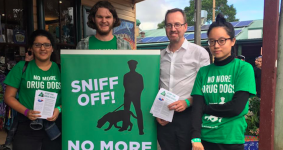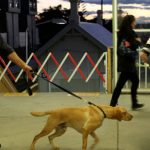Police Back Down on Sniffer Dogs: An Interview with MLC David Shoebridge

NSW police have begun to back off with their drug detection dog operations. The latest figures suggest that the number of searches carried out by police after a positive indication from a sniffer dog has almost halved over the last six years.
Back in 2011, when the NSW Greens’ Sniff Off campaign began, police conducted 16,459 searches. But figures reveal that this number has dramatically dropped to 9,497 searches carried out last year.
As to be expected, the rate of false positives – when a dog makes an indication, but no drugs are found – is still glaringly high. Figures so far this year reveal that 60 percent of the time police search people, they’re getting it wrong, and no illicit substances are found.
However, the false positive rate has dropped. In 2011, it was a phenomenal 78 percent. So we can surmise that not only are the police cutting back on drug dog operations, they’re also being more restrained in their application of them.
Get sniffed
Whether it’s when you’re getting off the train on your way home from work, when you’re sitting in the pub with friends, or while you’re out watching a band at a music festival, no one enjoys the invasive war-like presence of a sniffer dog operation.
That’s why the Sniff Off campaign has been leading the outcry against police use of drug dogs without a warrant in public places. A collaboration between Greens MLC David Shoebridge and the NSW Young Greens, Sniff Off has been keeping police under scrutiny for years now.
The campaign ramped it up in October 2014, when they launched the Sniff Off Facebook page. It provides a platform for members of the community to alert one another to the whereabouts of sniffer dog operations.
And with over 32,000 likes, that’s a lot of NSW citizens tipping each other off about the presence of drug detection dogs.
Increasing the harms
The use of sniffer dogs at festivals has caused a lot of controversy over recent years. Harm reduction experts point out that their presence can lead festival goers to partake in dangerous drug behaviours.
These include preloading, which is when a person takes all their drugs before arriving at an event to avoid detection. And another common practice is panic overdosing, when an individual takes all of their drugs at once when they see a police dog operation.
Ending the war
People are finally waking up to the fact the war on drugs is a failure. The prohibitionist system has led to increased drug use and the harms associated with it, fostered the growth of huge organised crime networks and caused mass incarceration.
So it seems absurd to be investing in a highly flawed drug law enforcement program like sniffer dogs. And we can all take a sigh of relief that police have backed off… at least a little.
David Shoebridge has been obtaining the search figures from the NSW police minister under the provisions of the Government Information (Public Access) Act 2009.
Sydney Criminal Lawyers® spoke with Mr Shoebridge about the impact their grassroots community-based campaign has been having.
Sniff Off have been monitoring NSW police drug detection dog operations since 2011. In that time, the number of sniffer dog searches in NSW has almost halved.
So David, why are NSW police backing off so much on their use of sniffer dogs?
The evidence against them is just becoming so overwhelming, and their false positive rate must have been so depressing that we’ve actually forced them to more carefully target their activities.
Our Facebook page kicked off in 2014. Since then, people have been able to avoid them as well. Because they’re getting the alerts from Sniff Off, and they know how to avoid having their human rights abused.
The figures show that police dog operations still have an overwhelmingly high false positive rate.
So far this year, 60 percent of people police have searched have had no illegal substances on them. But the false positive rate has dropped from the 78 percent it was back in 2011.
Why do you think the rate has dropped?
My suspicion for why the false positive rate has come back slightly is the result of the scrutiny that we put them under.
There appears to be slightly improved internal justification needed before a drug dog operation is carried out. Because they know what intense criticism they come under with their scattergun approach.
This isn’t just a result of Sniff Off. This is a result of the community attached to Sniff Off, who together are holding the police to account.
You’ve pointed out in the past that NSW police have been targeting certain areas and their communities with the searches. The 2013 figures showed that a passenger getting off at Redfern station was six and a half times more likely to be searched than a passenger getting off at Central.
Looking at the latest figures, are certain populations still being over-policed?
These figures that we’re releasing don’t tell us where they’re targeting. They’re state-wide figures.
But, the anecdotal reports that we are getting from Sniff Off still show a very unhealthy concentration around Redfern. And to some extent, we’re seeing an increase in activity in Blacktown in Sydney’s western suburbs.
Those are areas where the police have traditionally focused substantial discretionary policing resources.
When the police were really stepping up their use of drug detection dogs the largest expansion of operations was that of the NSW police transport command. Are the transport command backing off as well?
We’ve asked for the figures on transport command through parliament, and the government has refused to give them to us.
So we are now in the process of what looks like to be a lengthy freedom of information dispute with them to obtain those figures under the GIPA (Government Information Public Access) process.
We believe the public has a right to know these kinds of facts and figures, and we’ll fight for it.
And what about the use of strip searches that often accompany drug dog operations. Have we seen a drop in the police conducting them?
The number of strip searches don’t appear to have fallen as substantially as overall searches. But the number of false positives on strip searches – after that appallingly intrusive process – remain at, or above, the same level of false positives as before.
As you mentioned the Sniff Off Facebook page has led to people avoiding drug dog operations. What other sort of impacts do you think this grassroots tactic has had on the population?
It’s doing what I think is one of the most important things that any political campaign can do. It’s giving people information. And information is an enormous amount of power.
They can question the so-called intelligence behind police operations. They understand the real costs. And when they have those interactions with police – as a result of drug dogs – they now know their rights.
And besides the Facebook page, how else is Sniff Off carrying out its campaign at present?
We continue to work in the broader media, and draw attention to their failed drug dog campaign.
And an increasing part of our work is dealing with the absolute mess that is mobile drug testing (MDT), where thousands of people around the state are losing their licences, because they smoked a joint two or three days ago.
The mobile drug testing and the drug dog campaigns together are building support for reform all across this state.
And lastly, NSW police are obviously stepping down their use of drug detection dogs, and it’s plain to see that the Greens campaign, and public opinion in general, have had an effect.
What do you think is the next step to see these operations further put to a rest?
We’re hoping that Sniff Off will continue to grow. We do intend to expand the work we do with MDT.
And we are hopeful to have an announcement about the next stage of Sniff Off in the coming months.
David, thanks for taking the time out to have this chat today.
No worries.







